Justice and Peace
"YMCA Youth Staff Sharing Their Learnings on the Realities of Japanese Society"
"Change Agents: Learning in the Realities of Society"
Two youth staff members, Mizuki SAKACHI from Yokohama YMCA and Yuri YOSHIOKA from Osaka YMCA, participated in the World YMCA training program as change agents from Japan. They usually work at different local YMCAs and do not have a chance to meet each other often, but in March they participated in SCM (Students Christian Movement) training and fieldwork in Osaka together and had an opportunity to learn about community issues in Japan. They participated in SCM training in order to understand the four pillars of VISION 2030 in the context of the realities of Japanese society.
‘SCM field work in Kamagasaki’ (Report by Mizuki SAKACHI)
In February and March 2024, I participated in SCM training and field work. I attended two days of online lectures and then went to Osaka to do field work. The experience gave me new perspectives and insights, which I would like to share here:
Osaka is a major city in western Japan. It is well known for its commerce and manufacturing industries. Have you ever heard the term "gentrification"? Gentrification refers to the revitalization of relatively low-income residential areas in cities through redevelopment and cultural activities, resulting in soaring land prices, making it difficult for the original residents to continue living there.

When Japanese people hear about the “Nishinari” and “Ailin” districts in Osaka Prefecture, they might perceive them as "unsafe, scary neighborhoods." Through the SCM fieldwork conducted in Kamagasaki, a temporary lodging area located northeast of Nishinari Ward, we participated in activities that helped us understand the area. If you walk a little distance from Shin-Imamiya Station, you'll quickly reach Nishinari Ward. Kamagasaki is now undergoing change due to the Nishinari Special Zone Plan led by the city and prefecture of Osaka. As I mentioned earlier, this area is highly convenient and can attract people from other areas, which means that economic benefits are likely. However, it has also been a place where manual workers, who silently supported Osaka's development, formed communities seeking day labor and temporary accommodations during the high economic growth period of the Showa era. In recent years, with the decrease in day labor opportunities and the aging of residents, the temporary lodging facilities have been transformed into low-cost hotels and apartments.
There are still areas around the center where homeless people live. Their bedding in the arcade leading to the underground subway station is made of cardboard, and although each space is small, there are piles of belongings, placards, and furniture around the center.
 |  |
What I learned during my fieldwork in Kamagasaki is that there is a wider diversity of ways of living than I had previously realized. With welfare payments, many people who were previously living on the streets of Kamagasaki are now able to rent apartments. However there are still people living on the streets, some of whom have problems with interpersonal relationships or trouble with their neighbors. Some of them do not trust the government and do not want to rely on it. They believe they can support themselves if they work hard collecting empty cans, so they do not apply for welfare. I used to think that people were forced to live on the streets because they couldn't receive welfare benefits, but now I realize that for some of them their experiences and backgrounds have influenced their situations. Mr. Otani, the instructor for this SCM training, has been providing support for welfare recipients and conducting night patrols and life consultations for many years. He said that the people in Kamagasaki are interesting, and the words of those who work day by day for meals and lodging are honest.
‘Discrimination against minorities in Japan’ (Report by Yuri YOSHIOKA)
I would like to share what I have learned as I participated in the SCM training to learn about discrimination against minorities that exists in Japan.
This training has been available since 1979. It is a student Christian movement that questions discriminatory society and puts itself in the minority's shoes. The training was held online, with pre-training and site visits.
On February 28, 2024, I heard online from Mr. O, a Korean living in Japan, and Ms. Nagasaki, a Japanese supports Korean schools.
First, Mr.O talked about the history of discrimination against Korean residents in Japan and he faced discrimination.
He said there is a perception of assimilation and exclusion in Japan. It means that if you want to live in Japan, you have to become Japanese. Japan colonized Korea from 1910 to 1945. As a result, many Japanese had a strong sense of discrimination against Koreans in particular. During the colonial period, many Koreans moved to Osaka, Japan in search of work, and many of their descendants still live in Ikuno area of Osaka Prefecture.
Mr. O also lives there, and once the protest to exclude Koreans passed in front of his house, and he was terrified that his peaceful life with his children would be taken away.
In addition, during major earthquakes or other natural disasters, false information was sometimes spread about Koreans putting poison into wells. Furthermore, when Mr. O told his employer that he was a Korean resident in Japan, he could not get a job.
For avoid discrimination, he hid his real name (Korean name) and lived under a Japanese name.
These days, laws prohibiting hate speech have been enacted, and people are able to use the same system of pension and welfare systems as Japanese people.
Some people want to have Japanese and Korean names on their nameplates in front of their houses, so their understanding of minorities is improving.
Second, Ms. Nagasaki, who is a supporter of Korean schools, told us about the importance of having Korean schools.
Because the financial support from the government is far less than that of other Japanese schools, the school's equipment is sometimes not repairable. Furthermore, some children are discriminated by others for coming to this school. The reason why parents send their children to this school in such a situation is because they want to cherish their identity as one of Korean residents in Japan.
In the school, they can say their Korean name and be recognized for who they are. To know that although they face of discrimination, their parents and people in the community are devoted to them and there are Japanese people who want to live with them. They need to know that they are loved by those around them. She said students who come to Korean school are there to learn to love themselves.
On March 1, 2024, Ms. Nagasaki and I visited a Korean school in Ikuno City. A teacher dressed in traditional Korean costume was teaching there. The students communicate in the Korean language. They greeted us with a big voice and a nice smile.
Their pure smiles were impressive to me. I was taught how important the place where one's identity is protected for them.
In conclusion, I did not know much about what kind of discrimination against minorities existed in Japan, where I grew up.
By participating in the training, I learned the importance of actually seeing it. I wanted to protect places where children can smile.
It is important to insist about the inequalities of minority groups, but if we use the wrong advocacy methods, we may label a happy place as a pitiful place for children because many people avoid conflict and prefer to join the majority in Japan. I have reached the starting point of thinking about what I work at the YMCA can do to protect the pure smiles of the children.
I hope that we can become a country where even the smallest opinion is listened to properly, where both sides can be known and appreciate our differences.

Asian Youths Commit to Be Peacebuilders
Last Updated (Friday, 30 June 2023 14:21)
14 young people from nine countries of Asia participate in the second School of Peace (SoP) in Bali, Indonesia. The School of Peace runs from May 15, 2023, to July 13, 2023. These youths come from Nepal, Pakistan, Sri Lanka, Philippines, Vietnam, Mongolia, Bangladesh, Indonesia, and Timor-Leste. The Interfaith Cooperation Forum(ICF), a project of the Asia and Pacific Alliance of YMCAs organizes the School of Peace, the first one being held in Nepal from February to March, 2023. The participants come from different religious backgrounds, namely Hinduism, Islam, Buddhism, and Christianity. Some do not belong to any religion.
The main objective of the SOP is to prepare the youth to be change agents and peacebuilders in their communities. This program runs for 60 days in three different venues: 1) Puri Saron Madangan, 2) 5-Day Community Immersion in Blimbingsari Village and 2) Dyanapura City Hotel in Badung, Bali.
In this program, participants learn, among other things, about the tools of conflict analysis, peace, principles of negotiation, mediation and conciliation, understanding trauma, different religions, people’s impact on mother earth, nonviolent communication, journalism, mental health, and LGBTQI+ struggles.
“I’ve been fed a whole lot of new knowledge for the past 5 weeks in the SoP. This would truly help me become a better student-leader advocating for peace when I go back to my country,” Jaci, a participant from the Philippines shared.
After completion of the program, the participants will go back to contribute to their respective organizations and countries in creating sustainable peace and inspire social change.
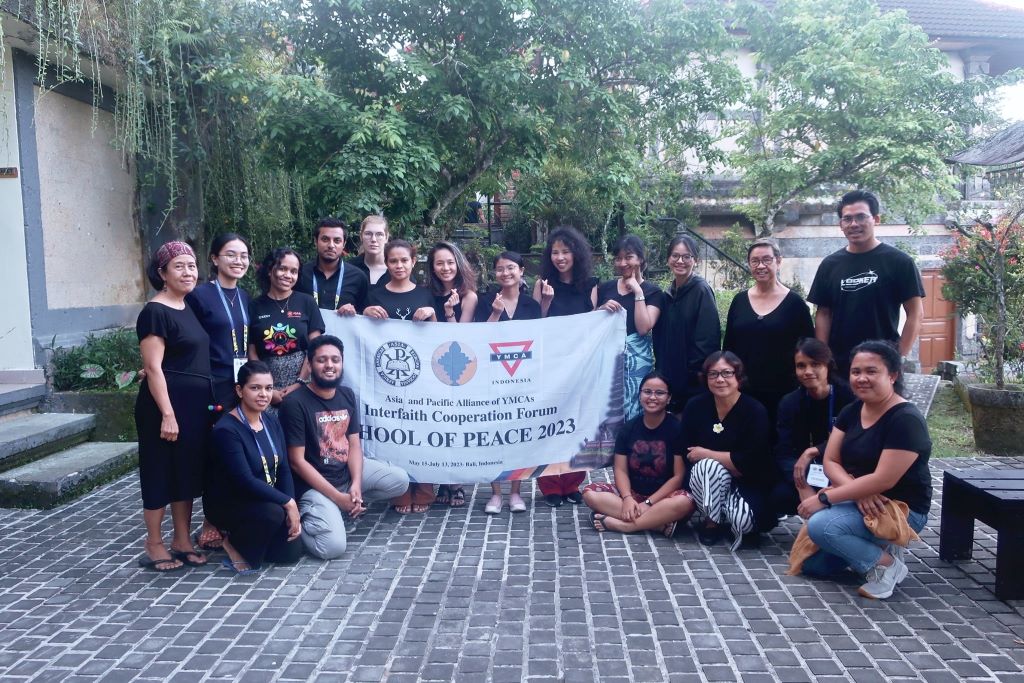 |
| ↑ SoP Participants in Bali Commemorating #ThursdaysinBlack. |
By Santoshi Wagle,
SoP Participant from Nepal
A Roundtable Meeting on Peace on the Korean Peninsula & Movement Strengthening Visit to Cambodia YMCA
Last Updated (Monday, 29 May 2023 16:55)
From May 23rd to 27th, 2023, GS Nam Boo-Won attended the Roundtable meeting on Peace on the Korean Peninsula in Siem Reap, Cambodia, followed by a movement visit. The meeting brought together peace practitioners and scholars from South Korea, the EU, China, the USA, the UN, and Japan and was organized by the Center for Peace and Conflict Studies (CPCA) under the leadership of Dr. Emma Leslie, the President. Building on past Korea meetings and dialogues in Cambodia, CPCS partnered with GPPAC (Global Partnership for the Prevention of Armed Conflict) Northeast Asia to hold the Roundtable this year with the aim of fostering ongoing conversations that contribute to a strategy for enhanced collaborative efforts for peace on the Korean Peninsula.
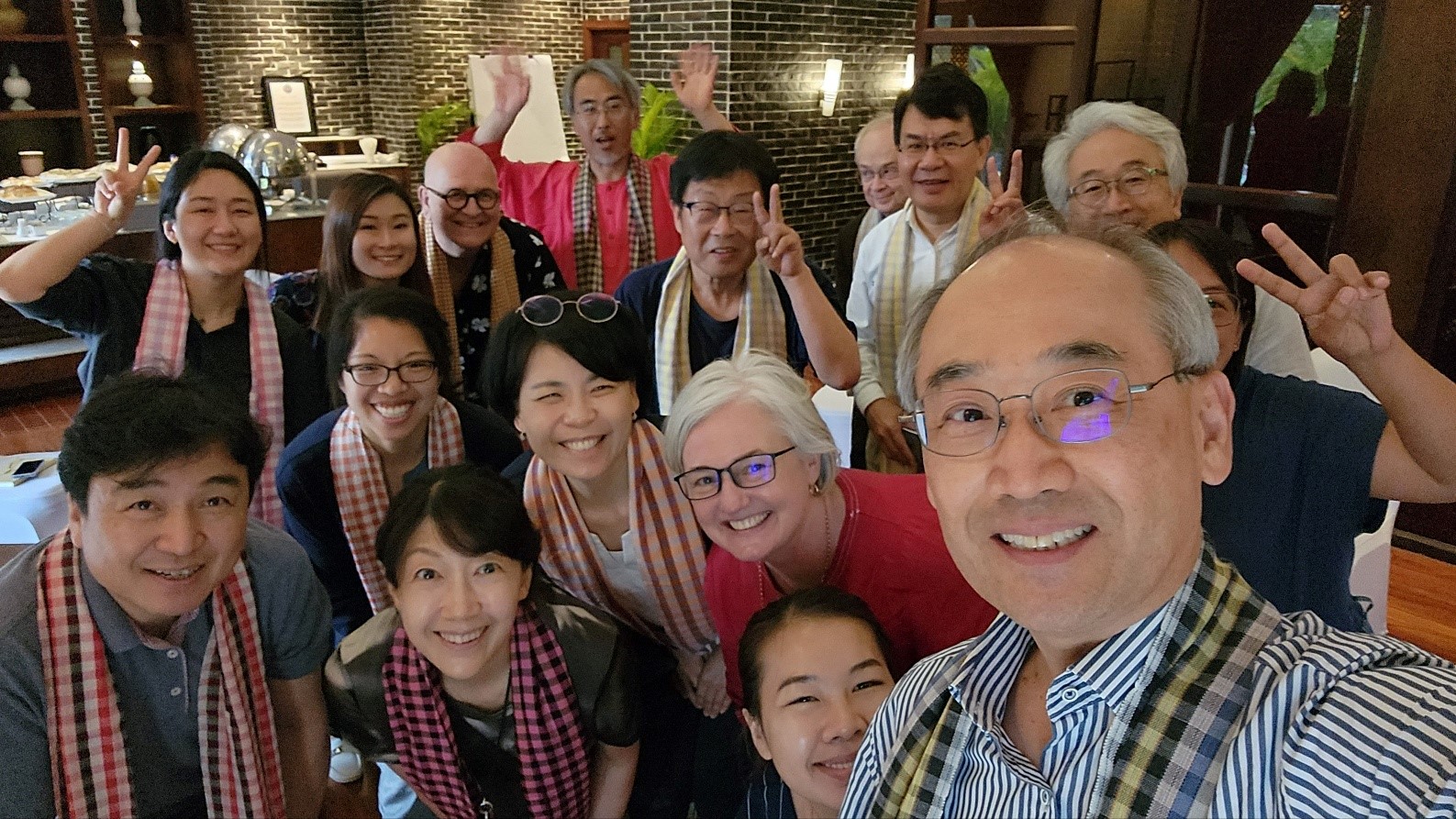 | 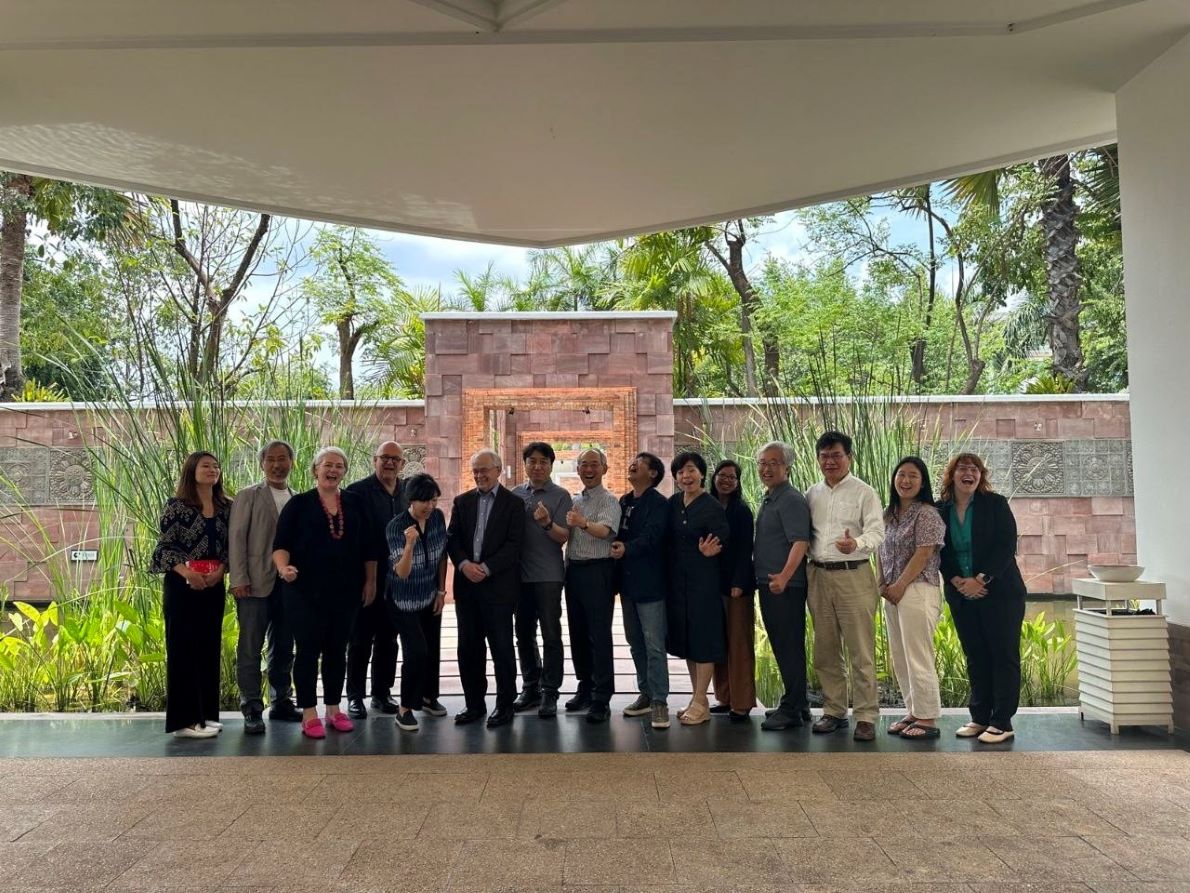 |
Over the course of two days, participants made presentations on their reflections and observations on local and regional trends and prospects in the Korean Peninsula, where tensions have recently increased. Facilitated discussions focused on developing a strategy for enhanced collaborative efforts among peace actors, addressing humanitarian needs in the DPRK, managing military rivalry in Asia, taking strategic steps for conflict prevention, and identifying critical factors, stakeholders, and strategic channels for intervention. All participants recognized the vital need for continued dialogue and networking among peace practitioners and organizations within the region and beyond for more impactful collaboration in the future.
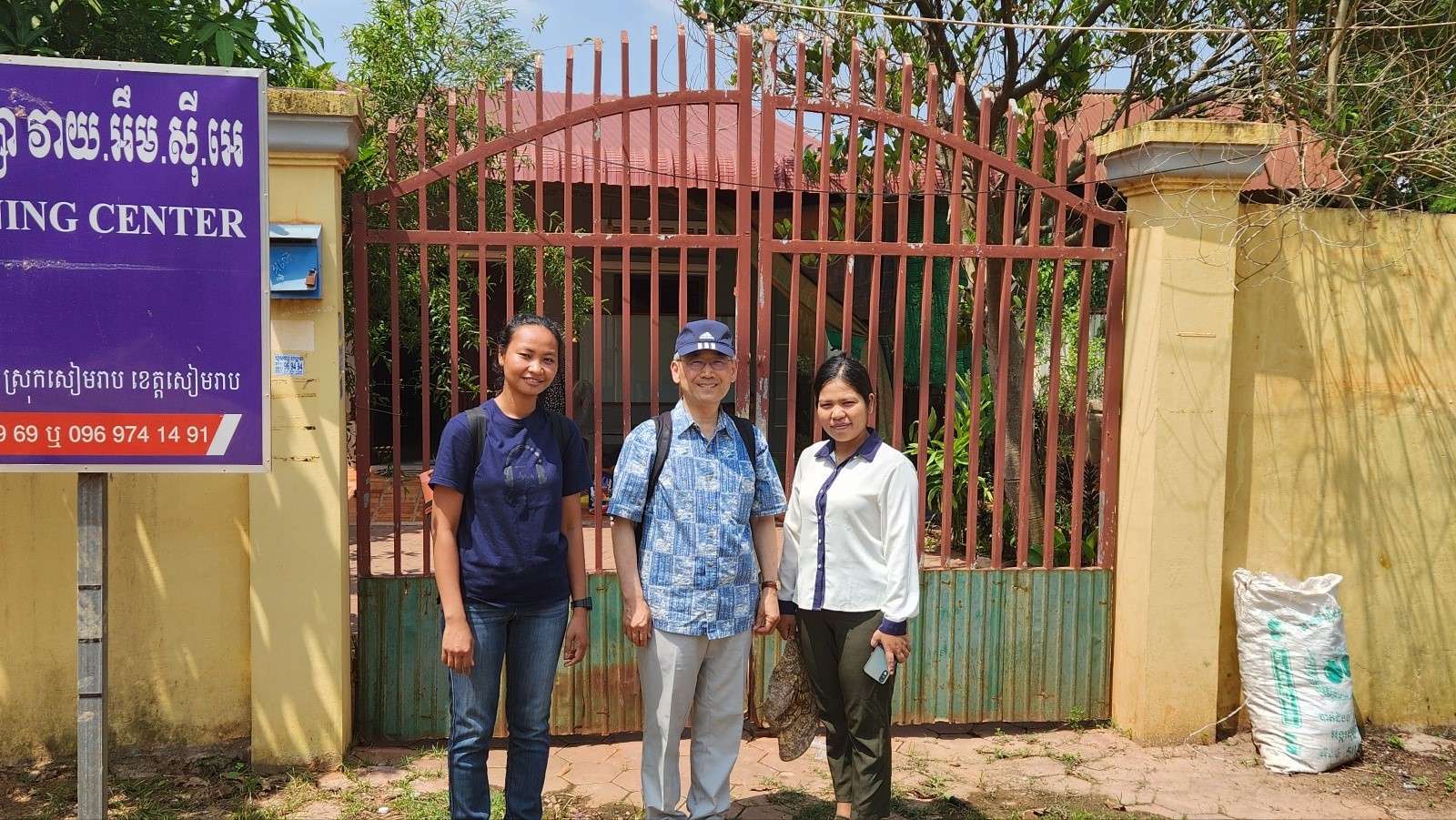 | 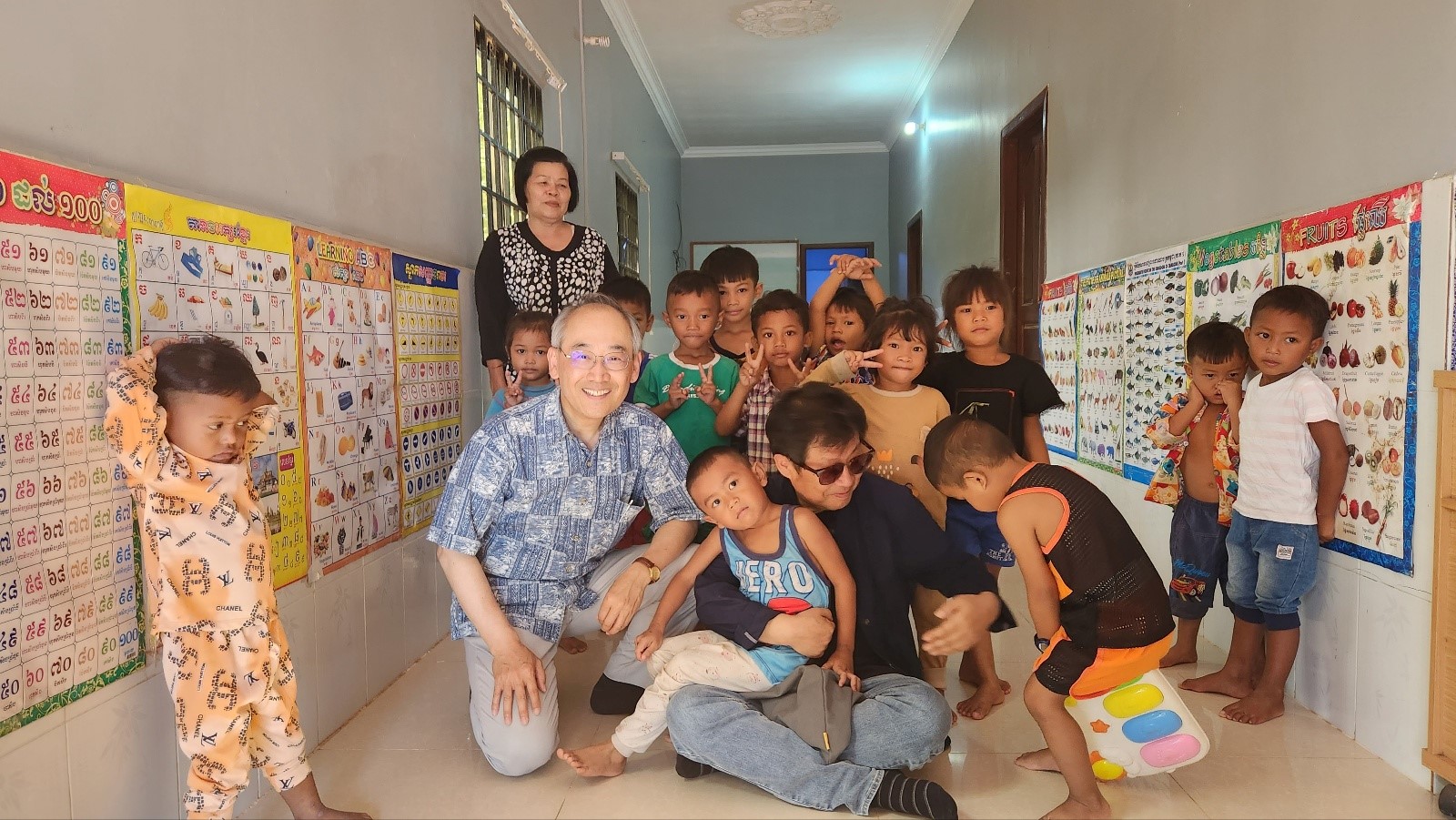 |
The last two days of the visit were dedicated to demonstrating APAY's solidarity with the YMCA and movement strengthening. GS Nam, NGS Kim Kyung-Min from Korea YMCA, and Acting GS Nimey Rin from Cambodia YMCA visited the YMCA Childcare and Learning Center, where the poorest of the poor live in Siem Reap. After visiting the center and a poor hut, NGS Kim promised to find a partner YMCA in Korea that could financially support the center and its valuable activities for children from the poorest areas in Siem Reap. GS Nam also had an in-depth discussion with Acting GS Nimey Rin and NGS Kim Kyung-Min on how to strengthen the Cambodia YMCA movement, particularly in the areas of governance, financial stability and sustainability, the YMCA’s presence in the community, and on how to multiply impacts in improving people's lives there.
By Nam Boo-Won
General Secretary, APAY
Yokohama YMCA organized a Prayer Meeting for Myanmar
A special prayer meeting for Myanmar was held on Saturday, May 6, 2023, hosted by the Yokohama YMCA International Committee. About 30 participants from Japan and abroad gathered for the online prayer meeting.
More than three years have passed since the military coup d’état in Myanmar in February 2021, and the people of Myanmar are still in a difficult situation. We, Yokohama YMCA, have long been involved in exchange programs and medical support activities with the Myanmar YMCA, but we have been forced to suspend our activities there. Even though we cannot meet in person, we hold a prayer meeting for Myanmar annually in May to express our desire to always be with them.
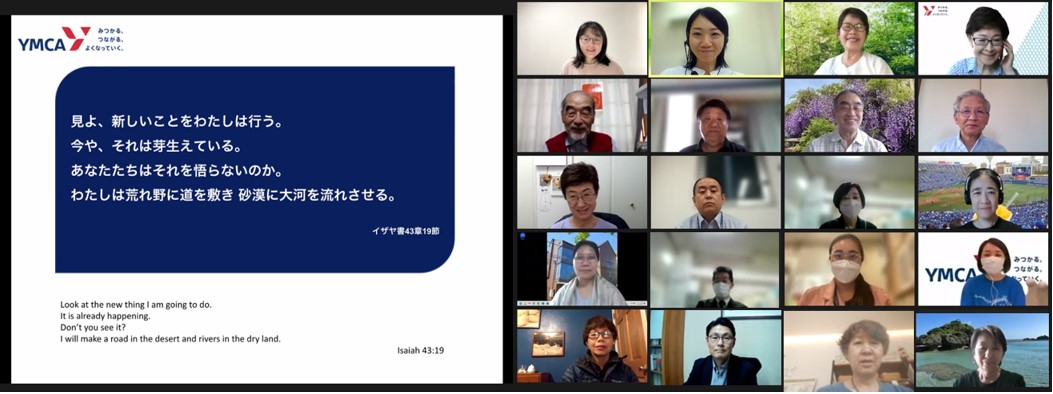
This time, we invited two Myanmar youths from Yokohama YMCA to speak about Myanmar. The youths gave the following message: "We hope that the people of Myanmar will have the peace, prosperity, and freedom they deserve, that the war in the country will end as soon as possible, and that a Just World will be realized in which human rights are not lost. Then, Ms. Khin Sangsan Aung, a pastor from Myanmar who lives in Japan, gave a message from Isaiah 43:19, "Let us not forget to hope amid difficulties, for God is with us". The message was very encouraging to us. Ms. Phyu Thin, President of Loikaw YMCA, also participated in the prayer meeting and reported that Loikaw YMCA had overcome many difficulties and has now been certified as a regional YMCA by the National Council YMCAs of Myanmar.
The situation has become even more serious due to the severe damage caused by the cyclone in Rakhine State, Myanmar.
Yokohama YMCA will always remember the people of Myanmar, pray for them, and continue to support them.
By Global & Local Community Services
Yokohama YMCA
ICF Welcomes 14 Participants for the School of Peace 2023 in Nepal
Last Updated (Friday, 03 March 2023 16:29)
“The School of Peace aims at building a community of youths who will be enabled to commit themselves to promote peace and harmony in their respective communities.”
After a week of zoom classes and self-learning, the Interfaith Cooperation Forum (ICF), together with its collaborator, the Nepal Unites, was happy to welcome the School of Peace (SoP) participants at Bhaktapur Guesthouse in Bhaktapur, Nepal on Monday the 30th of January. Fourteen participants from Bangladesh, Cambodia, Indonesia, Nepal, Pakistan, Philippines, Sri Lanka, Timor-Leste, and Vietnam arrived to spend the next 50 days together. The following day, the in-person SoP officially began with an Opening Ritual, including words of welcome from the owner of Bhaktapur Guesthouse, where the group will reside until the 25th of February. On the 25th the group will embark to experience a community immersion and move to the second venue at Ratna Giri Resort on March 1, where they will stay until the end of the in-person program on March 20th.
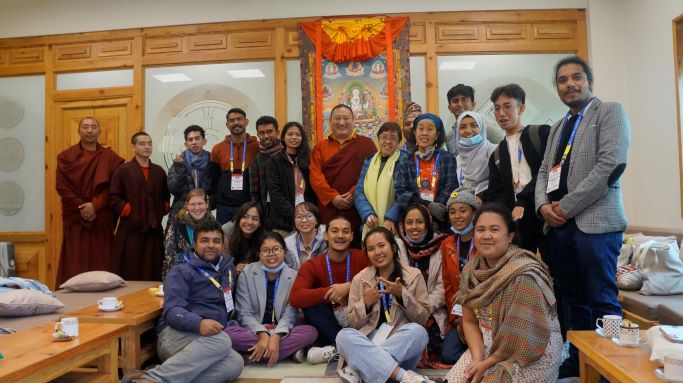
The participants learned about and discussed a range of different topics. In the beginning, the participants went through exercises in learning more about themselves, who are they, what they value, what makes them who they are, etc. This was done through the sharing of “Life Stories” that ICF Staff Baidido Saganding facilitated. It is important for the participants, as young peacebuilders, to know who they are and what they stand for before learning about others.
An important aspect of the SoP is the exploration of the major Asian religions and indigenous spirituality. Some religions and spiritualities were not familiar to some participants and they learned about these for the first time. Other religions or spiritualities were more familiar, especially to the participants who are adherents of such religions and spiritualities. But even then, their understanding of these religions was deepened. The different religions and spiritualities were covered either by in-house speakers like ICF Coordinator Muriel Orevillo-Montenegro on Judeo-Christian traditions or by visiting places of worship such as the White Monastery for a Dhamma talk. Beyond Judaism, Christianity, and Buddhism, the participants also got the chance to learn more about Hinduism, Islam, Jainism, Baha’i Faith, and Indigenous Spiritualties.
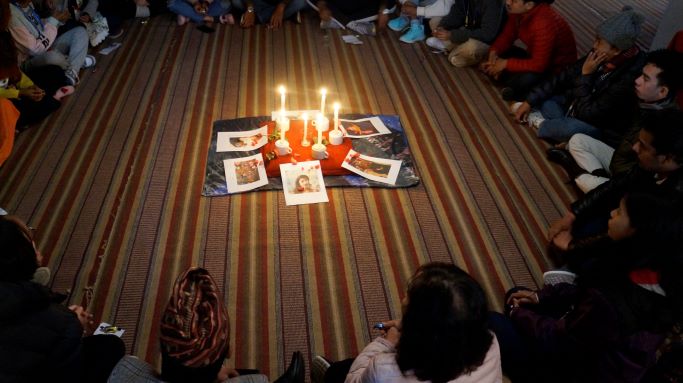 |  |
In addition to gaining knowledge about different religions and spiritualities, the SoP in Nepal already provided young peacebuilders with information on how to analyze a conflict and comprehend the peacebuilding frameworks from Galtung and Lederach. Furthermore, the SoP also focused on Human Rights, Children’s Rights, and Women’s Rights by exploring the UN Declarations and Conventions connected to these topics. A range of activities challenged the participants to recognize the situations in their countries and communities. Feminist theory and Ethics were introduced to provide the participants a lens for understanding the work for gender justice, the intersectionality of identities, including LGBTQI, and the connection of gender issues with the plunder of Mother Earth.
Another important issue that was discussed during the SoP was the Climate Crisis. Considering that all the participants come from countries that are highly affected by the consequences of climate change, this topic was much awaited by the participants.
SoP has four more weeks to go and there are many more topics to be covered and studied. ICF is looking forward to this upcoming time to spend learning together in Nepal.
Annika Denkmann
BftW Seconded Personnel
Read more...
Page 5 of 13





